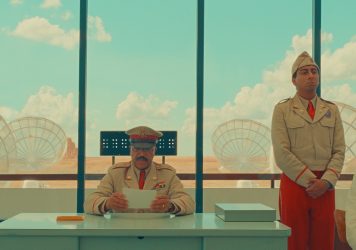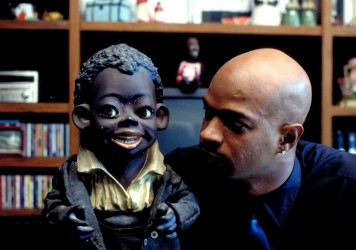Jeffrey Wright shines in a bold contemporary arts satire that doesn’t quite manage to hit all of its targets.
As the old saying goes, there are really no great movies whose title consists of two words, the first of which is “American”. There are some decent ones. There are, in fact, some very decent ones. But there’s something about this oft-employed title structure which is destined to prevent any film upon which it is adorned from attaining true, untrammelled greatness.
There’s no science behind it, but one might hazard that it denotes an attempt by the makers of the film to offer a grand gesture aimed not just at a small pocket of American society, but one that applies to everyone. Maybe the formulation doesn’t work because it suggests scuppered hubris – a lofty ambition that’s not met. When you’re stating that the lessons in the film you’ve made apply to everyone, you’re setting yourself up for a fall.
American Fiction is Cord Jefferson’s plucky entry into this cursed canon, and it is based on the 2001 satirical novel Erasure by the great author and academic, Percival Everett. One of the issues as to why it doesn’t quite work as a cohesive story is because, as above, it is too happy to generalise about subjects such as art, business and human behaviour, lacking either a precision that links it to reality or a surreal edge that links it to guns-blazing satire. There are some great things in this film, yet its intentions are swept up in a mire of tonal indecision and cynicism masquerading as irony.
And yet, Jeffrey Wright deserves his Academy Award nomination (and more!) for his louche, witty turn as misanthropic creative writing instructor Thelonious Monk. His name saddles him with oversized creative boots that he struggles to fill, the result of his desire to foist esoteric literary fiction (‘The Haas Conundrum’ anyone?) on his bemused agent Arthur (John Ortiz) who would rather his client produce more saleable material, perhaps inspired by his personal experiences as a Black American.
After drawing a woefully small crowd at a book festival, he saunters into a packed room to see the current golden girl of the Black literary scene Sinatra Golden (Issa Rae) reading a passage from her new novel, ‘We’s Lives in Da Ghetto’, which Monk dismisses as a smash-and-grab commodification of Black cultural clichés and milking Black trauma for the sole consumption of middle-class white liberals.
When the invoices start rolling in for his mother’s care home, Monk decides to throw in the towel of personal respectability and punch out a misery porn knock-off named ‘My Pafology’ under the pseudonym of illusive jailbird, Stagg R. Leigh. In one of the film’s most inventive scenes, we see Monk tapping away at his laptop, cackling at his sick genius, the physical characters playing out a violent altercation in front of him. Of course, his attempt to prove a moral point backfires when bidding wars start and a dangerous new literary celebrity (who doesn’t actually exist) is born.
The idea of an audience embracing art that has been calculated to be bad has been doing the rounds since Mel Brooks’ The Producers, and was updated for the digital era with a focus on modern minstrelsy by Spike Lee’s Bamboozled. And American Fiction doesn’t necessarily add much new to the mix, including the fact that the industry nabobs genuinely love ‘My Pafology’ rather than, say, accepting it as a work that ticks a lot of diversity boxes and thus reflects their own allyship, performative or otherwise.
All of which is to say, the film’s satire is framed as broadly comic rather than realist and authentic, with Jefferson more interested in guffawing at what dumb white editors and movie directors will swallow than delve into something more nuanced regarding racial inequality in the arts. But it’s still a funny film, and where it sometimes refuses to get its hands dirty, it fills in the gaps with a script that’s full of memorable and brilliantly delivered one-liners.
Another strange aspect of this film is that it is, in fact, two films, as alongside the screwball Stagg R. Leigh shenanigans there’s a doleful family melodrama running in tandem, charting Monk’s various familial and romantic woes. It’s understandable that Jefferson would want to use this other story to shade his cantankerous lead with some added emotional nuance, as well as show that he has the trifling logistics of everyday life to contend with, but it often plays too much like another, separate story that only has a superficial connection to the one about his wacky professional tribulations.
Little White Lies is committed to championing great movies and the talented people who make them.
Published 1 Feb 2024
A rare lead role for the great Jeffrey Wright.
The conceit is interesting and funny, even when it doesn’t feel authentic.
Can't decide if it's a melancholy character piece or an all-out comic satire.

The maestro returns, the patented formula tweaked to blissful perfection in this witty and deeply moving exploration of the tools that we produce to help us see beyond our everyday vision.

Find out by joining the author of ‘Facing Blackness’ for a special screening of the director’s 2000 film.

A black cop infiltrates the Ku Klux Klan in Spike Lee’s fiery, fiercely funny takedown of institutional racism.